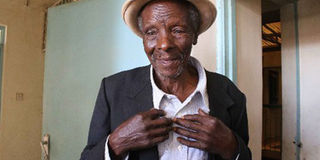Mau Mau ‘Postmaster’ who ensured information flow in bush

Mzee Macharia Nguyo speaks to Nation on May 30, 2016. The former Mau Mau veteran was in charge of fighters' post office. PHOTO | JOSEPH KANYI | NATION MEDIA GROUP
What you need to know:
- Mr Kanyiri was the man who dispatched all the letters and messages to and from Mau Mau fighters in the forests.
- Mr Kanyiri was privileged to learn how to communicate with the wazungu.
- Their ‘postboxes’ were holes in trees that the Mau Mau fighters had identified.
Memories of the Mau Mau rebellion in central Kenya that led to independence in 1963 are still fresh in the mind of Mr Macharia Nguyo Kanyiri, 87.
Popularly known as the ‘Mau Mau Postmaster’, Mr Kanyiri was the man who dispatched all the letters and messages to and from Mau Mau fighters in the forests.
He was given the role by his fellow Mau Mau adherents as he had refused to keep dreadlocks, the hairstyle adopted by the freedom fighters while living in the forest caves.
Being among the first Kikuyu men to work at the home of a white settler, Mr Kanyiri was privileged to learn how to communicate with the wazungu. He would travel from one place to another with his boss, who lived in Nyahururu.
Because he was sharp, he earned the trust of his employer and was delegated the duties of delivering letters from one white settler’s office and home to another across the region and in parts of Rift Valley, as far as Eldoret.
By the end of 1951, he was among a group of young men in the central region who got had tired of British colonial rule. They started strategising on how they could overthrow the government and gain independence.
The group was led by Field Marshal Dedan Kimathi, Waruhiu Itote alias “General China”, General Stanley Mathenge and Field Marshal Musa Mwariama, who were among the key leaders of the Mau Mau uprising.
TRUSTED SERVANT
“We took an oath that anyone who finds a pistol belonging to a British settler should not leave it as we would use the weapons when the war began in 1952,” Mr Kanyiri recalled.
Mr Kanyiri narrated how one day he was waiting for his boss in his sitting room and, because he was a trusted servant, the white man left his pistol on top of a sofa and went outside to deal with other issues.
“Seeing this was a great opportunity for me to own a pistol, I swiftly took the pistol and hid it under the cushion,” Mr Kanyiri recalled.
His boss used the pistol on his hunting expeditions.
On that day, Mr Kanyiri was to accompany his boss to Eldoret. When they returned late in the evening, he took the gun and hid it in a nearby forest.
“I dug a hole, hid it there and planted some grass on top of it,” Mr Kanyiri said, adding: “To avoid suspicion, I also urinated and left some faeces on top to turn people away.”
It was a fellow farm worker at the white settler’s home, a “shamba boy”, who was arrested after being suspecting of stealing the weapon.
When the Mau Mau uprising began, Mr Kanyiri, together with other fighters, went into the forest with their pistols, which they had stolen from the white settlers.
And because he was more experienced in delivering letters and did not have dreadlocks like the rest of the Mau Mau, he was made the postman. He would deliver letters and messages to the fighters in the Aberdares, Mt Kenya and other forests.
Their ‘postboxes’ were holes in trees that the Mau Mau fighters had identified.
Mr Kanyiri would also go to the forests, checking all postboxes and collecting the letters the fighters had written to their families and fellow Mau Mau.
According to Mr Kanyiri, it was the same pistol that he stole from his white employer that General China had when he was arrested for being in possession of a firearm unlawfully. Mr Kanyiri said had lent him the gun.
It was the Mau Mau war, which was fought from 1952 to 1960 that led Kenya’s Independence in 1963, and which Kenyans celebrate at the Madaraka Day events every June 1, including today, at Afraha Stadium in Nakuru.





